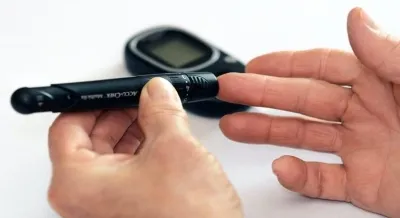Could Blood Sugar Responses to Carbohydrates Indicate Prediabetes Risk?

Synopsis
Key Takeaways
- Blood sugar responses to carbohydrates can indicate prediabetes risk.
- Variations in responses relate to metabolic conditions like insulin resistance.
- Personalized dietary strategies may emerge from understanding individual responses.
- Consumption of fiber or protein can mitigate glucose spikes.
- Identifying biomarkers for insulin resistance is essential for future diagnostics.
New Delhi, June 5 (NationPress) Blood sugar reactions following meals, particularly those rich in carbohydrates, might reveal insights about metabolic health and highlight the potential risk of prediabetes, as per recent research.
Researchers from Stanford University in the US have noted that variations in blood sugar response among individuals correlate with specific metabolic disorders like insulin resistance or beta cell dysfunction, both of which are precursors to diabetes.
Published in Nature Medicine, these findings imply that understanding this variability could facilitate tailored prevention and treatment approaches for prediabetes and diabetes.
Michael Snyder, a professor of genetics at Stanford Medicine, stated, 'This study indicates that not only are there different subtypes of prediabetes, but also that your specific subtype might dictate the types of foods you should avoid or include in your diet.'
In this investigation, 55 individuals without a prior history of Type 2 diabetes underwent metabolic assessments to check for insulin resistance and beta cell issues. The participants also underwent extensive multi-omics profiling, which encompassed tests for triglyceride levels, plasma metabolites, liver function evaluations, and gut microbiome analysis.
Notably, nearly half of the participants, totaling 26, were diagnosed with prediabetes.
The analysis revealed that multiple participants experienced a blood glucose surge after consuming rice or grapes, irrespective of their metabolic wellness.
Responses to foods high in resistant starch, like potatoes and pasta, varied based on the individuals' metabolic health.
It was found that participants whose blood sugar rose significantly after eating bread tended to have hypertension or elevated blood pressure.
Moreover, contrasting blood glucose responses to potatoes versus grapes were linked with insulin resistance, indicating that this ratio may function as a potential biomarker for insulin resistance in clinical settings.
Tracey McLaughlin, a professor of endocrinology at the university, remarked, 'Such a biomarker would be beneficial since insulin resistance can be addressed through lifestyle and medication changes that can mitigate diabetes risk in susceptible individuals. Currently, there is no straightforward diagnostic method available in clinical practice.'
The study also discovered that consuming fiber or protein before rice reduced the glucose spike, and ingesting fat beforehand delayed the peak of that spike.
However, these alterations in blood glucose response were only observed in participants who were metabolically healthy, possessing insulin sensitivity or normal beta cell function, prompting the researchers to call for additional studies.









